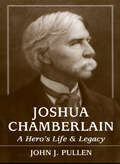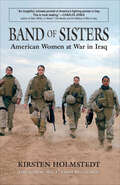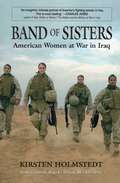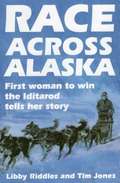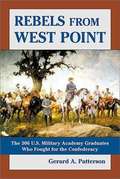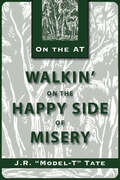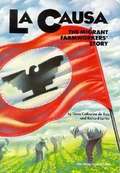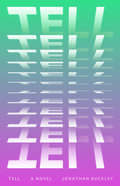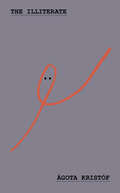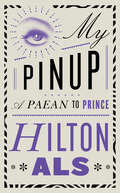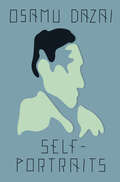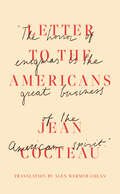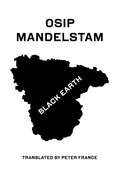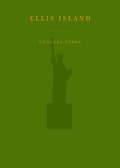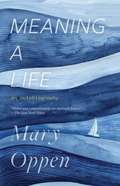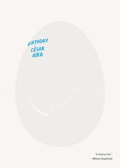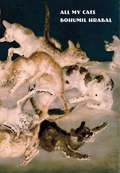- Table View
- List View
Joshua Chamberlain: A Hero's Life and Legacy
by John J PullenFrom a National Book Award finalist, an &“entertaining and inspiring&” biography of the heroic Gettysburg commander, college president, and governor of Maine (Senator George J. Mitchell). This is a vivid account of the life of Joshua Chamberlain, whose is best known for leading a successful bayonet charge against a Confederate assault that was memorialized in the film Gettysburg—and earned Chamberlain the Medal of Honor. But his life was long and his military, political, and academic careers were filled with numerous notable accomplishments as well, among them the governorship of Maine and presidency of Bowdoin College, before his Civil War wounds finally caught up with him in 1914. This account, with illustrations included, tells his absorbing, wide-ranging story, explores his continuing mystique, and paints a vivid picture of late nineteenth-century New England. &“A worthy tribute to Chamberlain&’s lasting legacy.&” —Civil War Book Review &“Joshua Chamberlain was much more than a war hero, and Pullen&’s thoughtful book fills out the picture of his remarkable life.&” —Senator George J. Mitchell &“Reveal[s] a complicated character, without diminishing the almost mythic status he has assumed.&” —The Washington Times
Band of Sisters: American Women at War in Iraq
by Kirsten HolmstedtTwelve American women serving in the military share their gripping personal stories of combat in Iraq. In Iraq, the front lines are everywhere—and everywhere in Iraq, no matter what their job descriptions say, women in the U.S. military are fighting. More than 155,000 of them have deployed to Iraq and Afghanistan since 2003—four times the number of women sent to Desert Storm in 1991. More than 430 have been wounded and over seventy killed—almost twice the number of American women killed in action in Korea, Vietnam, and Desert Storm combined. But should women be in combat? Do they have what it takes to be warriors? Compelling questions once, but now empty because, more than ever, American women are in combat, and they are warriors. The real question is: What are their experiences of war? We haven&’t heard their stories—until now. Band of Sisters presents a dozen groundbreaking and often heart-wrenching stories of American women in combat in Iraq, such as the U.S.&’s first female pilot to be shot down and survive, the military&’s first black female pilot in combat, a young turret gunner defending convoys, and a nurse struggling to save lives, including her own. As one female service member said, &“We love our country as much as any man, and we have made the same sacrifices as our brothers in arms.&” Band of Sisters reveals those sacrifices for the first time. Praise for Band of SistersWinner of the 2007 American Authors Association Golden Quill AwardWinner of the 2007 Military Writers Society of America Founder's Award&“An insightful, intimate portrait of America&’s fighting women in Iraq. This is must reading.&” —Charles Jones, author of Red, White, or Yellow?: The Media and the Military at War in Iraq &“Lyrical, visceral, and potent. Kirsten Holmstedt sets a peerless standard as a raconteur with powerful stories of the valor of today&’s women in combat.&” —David J. Danelo, author of Blood Stripes and The Border&“This overdue account . . . reads a swiftly as a thriller, but the thrills here come from the real sacrifices and valor of America&’s fighting women.&” —Ralph Peters, author of Never Quit the Fight and Wars of Blood and Faith&“Inspirational and revealing.&” —Paul Riechkhoff, executive director, Iraq and Afghanistan Veterans of America, and author of Chasing Ghosts
Band of Sisters: American Women at War in Iraq
by Kirsten HolmstedtIn Iraq, the front lines are everywhere . . . and everywhere in Iraq, no matter what their job descriptions say, women in the U. S. military are fighting - over 155,000 of them. A critical and commercial success in hardcover, Band of Sisters presents a dozen groundbreaking and often heart-wrenching stories of American women in combat in Iraq, such as the US's first female pilot to be shot down and survive, the military's first black female pilot in combat, a young turret gunner defending convoys, and a nurse struggling to save lives, including her own.
Race Across Alaska: First Woman to Win the Iditarod Tells Her Story
by Libby Riddles Tim JonesLibby Riddles wanted an adventure. At age 16 she left home for the snowy wilderness of Alaska, the Last Frontier. There her love of animals drew her to the sport of sled dog racing. When she entered the Iditarod, the famous marathon from Anchorage to Nome, she was just another Iditarod Nobody. Twelve hundred miles later, having conquered blizzards, extreme cold, and exhaustion, she and her dogs crossed the final stretch of sea ice, miles ahead of the nearest competitor... and suddenly she realized: I will be the first woman to win the Iditarod. This is the story of a courageous woman and her heroic dogs. This is the story of Libby Riddles's adventure.
Rebels From West Point
by Gerard A. PattersonThis is the Story of the Confederate officers who graduated from West Point and later joined the Confederate army. It tells of their characters, their actions, and all that their choice to leave the Union lost them.
Walkin' on the Happy Side of Misery: A Slice Of Life On The Appalachian Trail (On the AT)
by J.R. "Model-T" TateThis memoir of a retired Marine corps officer&’s hike on the Appalachian trial is a humorous, inspirational travel narrative of the journey of a lifetime. &“In early spring each year, an exodus takes place in this country. A cross-section of humankind makes its way singly, or by two&’s and three&’s, to an isolated mountaintop in northeast Georgia. These sojourners—weird looking creatures burdened with huge loads and wearing strange garments—are linked by their appearance and behavior. They share a common purpose: to hike the Appalachian Trail from Georgia&’s Springer Mountain to Mount Katahdin in a single season. These creatures call themselves &‘thru-hikers.&’&” So begins J.R. &“Model-T&” Tate&’s tale of his own thru-hike of the AT. As he recollects grueling climbs, knee-wrecking descents, mountaintop thunderstorms, snakes underfoot, and the myriad characters he encounters, Tate also conveys the beauty of the trail and the community that surrounds it in this inspiring travelogue.
Dan Beard, Scoutmaster of America
by Wyatt BlassingameDan Beard was happiest when he was out-of-doors. As a boy, he spent much time hiking, fishing, and rafting. He became a map maker so that he could work outside. He started the Sons of Daniel Boone so that boys could learn to love nature. Then, his group merged with several other groups to become Boy Scouts of America.
John Muir
by Margaret Goff ClarkA biography of the nineteenth-century naturalist, explorer, and writer who was influential in establishing our national park system.
Their Eyes on the Stars: Four Black Writers
by Margaret Goff ClarkTraces the lives of four black writers who wrote of the Negro experience in eighteenth-and nineteenth-century America: Jupiter Hammon, George Moses Horton, William Wells Brown, and Charles Waddell Chesnutt.
Benjamin Banneker: Astronomer and Scientist
by Margaret Goff ClarkA biography of Benjamin Banneker, a black astronomer and scientist.
Martin Luther King, Jr.: Man of Peace
by Lillie Patterson Victor MaysA brief biography of Martin Luther King Jr, that helps the readers understand what it entails to have a fulfilling and successful life.<P><P>Winner of the Coretta Scott King Medal
La Causa: The Migrant Farm Workers' Story
by Alex Haley Richard Larios Dana Catherine de RuizDescribes the efforts in the 1960s of Cesar Chavez and Dolores Huerta to organize migrant workers in California into a union which became the United Farm Workers.
Young Martin's Promise
by Walter Dean MyersRelates events in Martin Luther King, Jr.'s, childhood which sowed the seeds for his activism for equal rights for people, regardless of their color.
Sitting Bull
by Herman J. ViolaA biography of the American Indian who engineered the defeat of Custer and his troops at Little Big Horn and toured with Buffalo Bill's Wild West Show.
Tell
by Jonathan BuckleyCo-winner of the 2022 Novel Prize, Tell is an exuberant, intensely fluid, and probing examination of the ways in which we make stories of our own and of other people’s lives A novel of intense, flickering intelligence, Tell is structured as a series of interviews with a woman who worked as a gardener for a wealthy businessman and art collector who has mysteriously disappeared, and may or may not have committed suicide. What might be a gloomy subject is instead alluring, lit from within by a lively deep knowledge of human nature: Buckley's eye for motivations brings to mind a Thomas Hardy for our atomized 21st-century. A thrilling novel of strange, intoxicating immediacy, Tell carries the pleasures of exciting new gossip enjoyed with a rare old cognac by a crackling fire. Calling his work “captivating,” John Banville has asked: “Why isn’t Jonathan Buckley better known?”
The Illiterate
by Ágota KristófIn 2004, late in her legendary career, Ágota Kristóf wrote this slim dagger of a memoir about being a refugee after fleeing Hungary in 1956 Narrated in a series of stark, brief vignettes, The Illiterate is Ágota Kristóf’s memoir of her childhood, her escape from Hungary in 1956 with her husband and small child, her early years working in factories in Switzerland, and the writing of her first novel, The Notebook. Few writers can convey so much in so little space. Fierce yet almost pointedly flat and documentarian in tone, Kristóf portrays with a disturbing level of detail and directness an implacable message of loss: first, she is forced to learn Russian as a child (with the Soviet takeover of Hungary, Russian became obligatory at school); next, at age twenty-one, she finds herself required to learn French to survive: I have spoken French for more than thirty years, I have written in French for twenty years, but I still don’t know it. I don’t speak it without mistakes, and I can only write it with the help of dictionaries, which I frequently consult. It is for this reason that I also call the French language an enemy language. There is a further reason, the most serious of all: this language is killing my mother tongue.
War Diary
by Yevgenia BelorusetsA monumental, deeply penetrating document of life in Kyiv during the first forty-one days of the Russian invasion of Ukraine The young artist and writer Yevgenia Belorusets was in her hometown of Kyiv when Putin’s “special military operation” against Ukraine began on the morning of February 24, 2022. With the shelling of Kyiv, Kharkiv, Odessa, and Kherson, the war with Russia had clearly, irreversibly begun: “I thought, this has been allowed to happen, it is a crime against everything human, against a great common space where we live and hope for a future.” With power and clarity, the War Diary of Yevgenia Belorusets documents the long beginning of the devastation and its effects on the ordinary residents of Ukraine; what it feels like to interact with the strangers who suddenly become your “countrymen”; the struggle to make sense of a good mood on a spring day; the new danger of a routine coffee run. First published in the German newspaper Der Spiegel and then translated and released each day on the site ISOLARII (and on Artforum), the War Diary had an immediate impact worldwide: it was translated by an anonymous collective of writers on Weibo; read live by Margaret Atwood on International Women’s Day; adapted for an episode of This American Life on NPR; and brought to the 2022 Venice Biennale by President Zelensky as part of the pavilion “This is Ukraine: Defending Freedom.”
My Pinup
by Hilton AlsMarrying the memoir and essay forms while exploring desire, Prince, and racism, Hilton Als’s My Pinup expands and delivers love. In this brilliant two-part memoir, the Pulitzer Prize–winning writer Hilton Als distills into one cocktail the deep and potent complexities of love and of loss, of Prince and of power, of desire and of race. It’s delicious and it’s got the kick of a mule, especially as Als swirls into his mix the downtown queer nightclub scene, the AIDS crisis, Prince’s ass in his tight little pants, an ill-fated peach pie, Dorothy Parker, and his desire for true love. Always surprising and stealthily—even painfully—moving, Als plumbs longing: “I inched closer to him as he danced to you, Prince. But already he was you, Prince, in my mind. He had the same coloring, and the same loneliness I wanted to fill with my admiration. I couldn’t love him enough. We were colored boys together. There is not enough of that in the world, Prince—but you know that. Still, when other people see that kind of fraternity they want to kill it. But we were so committed to each other, we never could work out what that violence meant. There was so much love between us. Why didn’t anyone want us to share it?”
Self-Portraits: Stories
by Osamu DazaiBringing together novelist Osamu Dazai’s best autobiographical shorts in a single, slim volume, Self-Portraits shows the legendary writer at his best—and worst “Art dies the moment it acquires authority.” So said Japan’s quintessential rebel writer Osamu Dazai, who, disgusted with the hypocrisy of every kind of establishment, from the nation’s obsolete aristocracy to its posturing, warmongering generals, went his own way, even when that meant his death—and the death of others. Faced with pressure to conform, he declared his individuality to the world—in all its self-involved, self-conscious, and self-hating glory. “Art,” he wrote, “is ‘I.’” In these short stories, collected and translated by Ralph McCarthy, we can see just how closely Dazai’s life mirrored his art, and vice versa, as the writer/narrator falls from grace, rises to fame, and falls again. Addiction, debt, shame, and despair dogged Dazai until his self-inflicted death, and yet despite all the lies and deception he resorted to in life, there is an almost fanatical honesty to his writing. And that has made him a hero to generations of readers who see laid bare, in his works, the painful, impossible contradictions inherent in the universal commandment of social life—fit in and do as you are told—as well as the possibility, however desperate, of defiance. Long out of print, these stories will be a revelation to the legions of new fans of No Longer Human, The Setting Sun, and The Flowers of Buffoonery.
Letter to the Americans
by Jean CocteauLike Alexis de Tocqueville a century earlier, Jean Cocteau offers a powerful reminder to Americans of their own potential—and issues In 1949, Jean Cocteau spent twenty days in New York, and began composing on the plane ride home this essay filled with the vivid impressions of his trip. With his unmistakable prose and graceful wit, he compares and contrasts French and American culture: the different values they place on art, literature, liberty, psychology, and dreams. Cocteau sees the incredibly buoyant hopes in America’s promise, while at the same time warning of the many ills that the nation will have to confront—its hypocrisy, sexism, racism, and hegemonic aspirations—in order to realize this potential. Never before translated into English, Letter to the Americans remains as timely and urgent as when it was first published in France over seventy years ago.
Black Earth: Selected Poems and Prose
by Osip MandelstamRussia’s foremost modernist master in a major new translation Osip Mandelstam has become an almost mythical figure of modern Russian poetry, his work treasured all over the world for its lyrical beauty and innovative, revolutionary engagement with the dark times of the Stalinist era. While he was exiled in the city of Voronezh, the black earth region of Russia, his work, as Joseph Brodsky wrote, developed into “a poetry of high velocity and exposed nerves, becoming more a song than ever before, not a bardlike but a birdlike song … something like a goldfinch tremolo.” Peter France—who has been brilliantly translating Mandelstam’s work for decades—draws heavily from Mandelstam’s later poetry written in Voronezh, while also including poems across the whole arc of the poet’s tragically short life, from his early, symbolist work to the haunting elegies of old Petersburg to his defiant “Stalin poem.” A selection of Mandelstam’s prose irradiates the poetry with warmth and insight as he thinks back on his Petersburg childhood and contemplates his Jewish heritage, the sunlit qualities of Hellenism, Dante’s Tuscany, and the centrality of poetry in society.
Ellis Island
by Georges PerecA moving hybrid work about Ellis Island and immigration by the marvelous Georges Perec Georges Perec, employing lyrical prose meditations, lists, and inventories, conjures up the sixteen million people who, between 1890 to 1954, arrived as foreigners and stayed on to become Americans. Perec (who by the age of nine was an orphan: his father was killed by a German bullet, and his mother perished in Auschwitz) is wide-awake to the elements of chance in immigration and survival: “To me Ellis Island is the ultimate place of exile. That is, the place where place is absent, the non-place, the nowhere. Ellis Island belongs to all those whom intolerance and poverty have driven and still drive from the land where they grew up.” Ellis Island is a slender Perec masterwork, unique among his many singular works. The acclaimed poet and scholar Mónica de la Torre contributes an afterword that keeps Perec's writing front and center while situating Ellis Island in the context of America’s current fierce battles over immigration.
Meaning a Life: An Autobiography
by Mary OppenA classic of twentieth-century American autobiography now back in print with previously unpublished material from the author’s archive First published in 1978, Mary Oppen’s seminal Meaning a Life has been largely unavailable for decades. Written in her sixties, her first and only prose book recounts, with honesty, depth, and conviction, her fiercely independent life—“a twentieth-century American romance,” as Yang describes it in the new introduction, “of consciousness on the open road; a book of travel where the autobiographer is not the usual singular self at the center of the story but the union of two individuals.” Oppen tells the story of growing up with three brothers in the frontier towns of Kalispell, Montana, and Grants Pass, Oregon, determined to escape the trap of “a meaningless life with birth and death in a biological repetition.” That escape happens in the fall of 1926, when she meets another student in her college poetry class, George Oppen. She is expelled for breaking curfew, and from then on the two face the world intertwined: living a life of conversation, hitchhiking across the US, sailing from the Great Lakes to New York City, meeting fellow poets and artists, starting a small press with Zukofsky and Pound, traveling by horse and cart through France, and fighting fascism through the Great Depression. Mary Oppen writes movingly of both her inner life and external events, of the inconsolable pain of suffering multiple stillbirths, of her husband fighting on the front lines during WWII while she struggled to care for their baby daughter, of fleeing to Mexico to avoid persecution for their political activities. This expanded edition includes a new section of prose and poetry that deepens Oppen’s radiantly incisive memoir with further memories, travels, and reflections.
Birthday
by César AiraBirthday is among the very best of Aira—it will surprise readers new to his work, and will deeply satisfy his many fans Before you know it you are no longer young, and by the way, while you were thinking about other things, the world was changing—and then, just as suddenly you realize that you are fifty years old. Aira had anticipated his fiftieth—a time when he would not so much recall years past as look forward to what lies ahead—but the birthday came and went without much ado. It was only months later, while having a somewhat banal conversation with his wife about the phases of the moon, that he realized how little he really knows about his life. In Birthday Aira searches for the events that were significant to him during his first fifty years. Between anecdotes ,and memories, the author ponders the origins of his personal truths, and meditates on literature meant as much for the writer as for the reader, on ignorance, knowledge, and death. Finally, Birthday is a little sad, in a serene, crystal-clear kind of way, which makes it even more irresistible.
All My Cats
by Bohumil HrabalA literary master’s story about the aggravations and great joys of cats, from “a most sophisticated novelist, with a gusting humor and a hushed tenderness of detail” (Julian Barnes) In the autumn of 1965, flush with the unexpected success of his first published books, the Czech author Bohumil Hrabal bought a cottage in Kersko. From then until his death in 1997, he divided his time between Prague and his country retreat, where he wrote and tended to a community of feral cats. Over the years, his relationship to cats grew deeper and more complex, becoming a measure of the pressures, both private and public, that impinged on his life as a writer. All My Cats, written in 1983 after a serious car accident, is a confessional memoir, the chronicle of an author who becomes overwhelmed. As he is driven to the brink of madness by the dilemmas created by his indulgent love for the animals, there are episodes of intense brutality as he controls the feline population. Yet in the end, All My Cats is a book about Hrabal’s relationship to nature, about the unlikely sources of redemption that come to him unbidden, like a gift from the cosmos—and about love.
